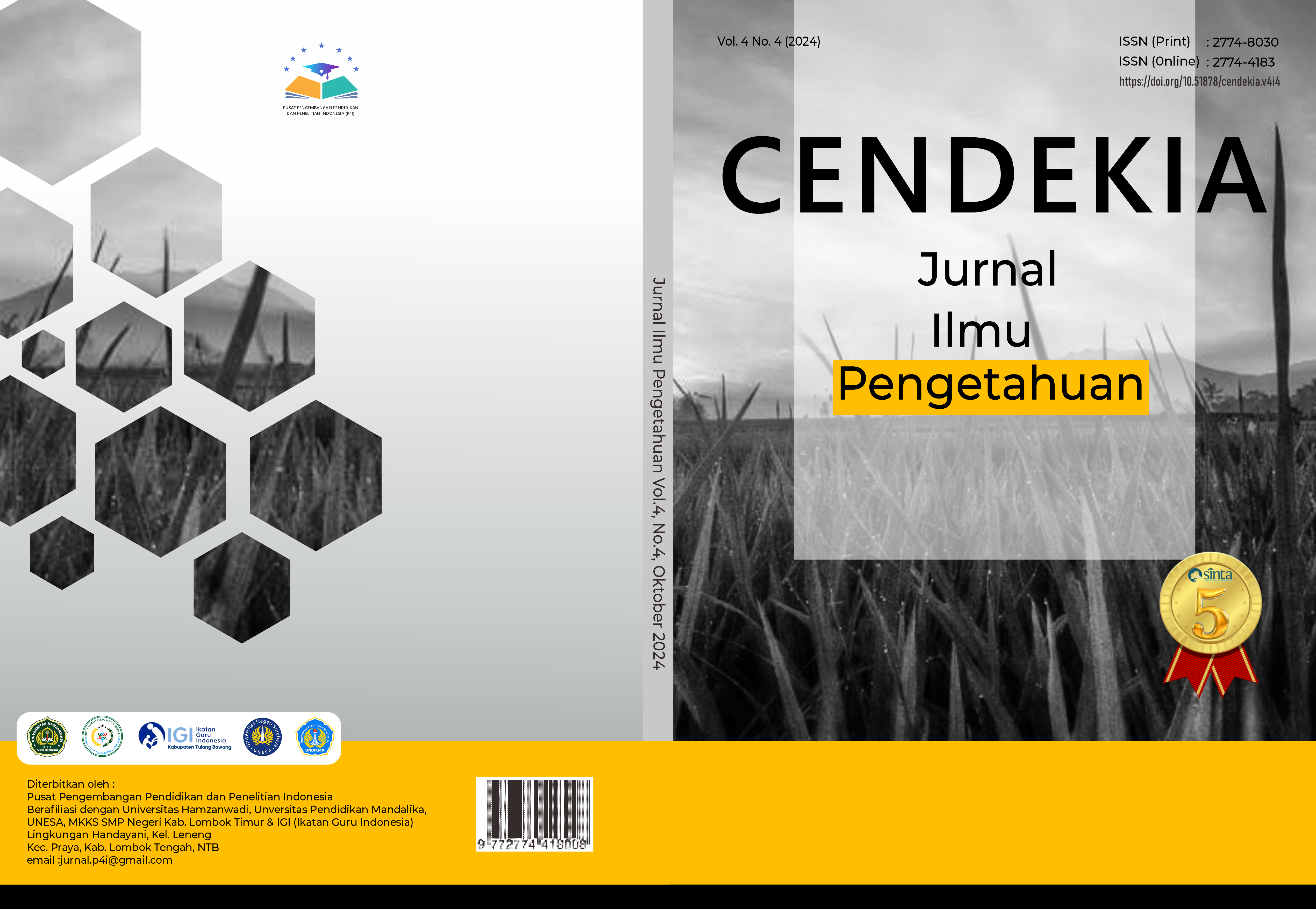TRANSFORMASI DIGITAL DAN FILSAFAT KEPEMIMPINAN DALAM BIROKRASI: TANTANGAN DAN PELUANG
DOI:
https://doi.org/10.51878/cendekia.v4i4.4006Keywords:
Transformasi Digital, Filsafat Kepemimpinan, BirokrasiAbstract
Digital transformation in bureaucracy is an unavoidable phenomenon in the current era of globalization and technological advancement. This process not only changes the way the government delivers public services, but also demands fundamental changes in leadership philosophy. In this context, visionary, participatory, and adaptive leadership becomes very important. This study aims to explore the challenges and opportunities faced by the bureaucracy in the digital transformation process, and how leadership philosophy can influence the success of the transformation. Many civil servants are worried about losing their jobs due to automation, which results in resistance to the implementation of new technologies. In addition, inadequate technological infrastructure is a major obstacle to the implementation of effective digital systems. The role of leadership philosophy in this context is crucial. Visionary leadership is able to provide clear direction and motivate employees to adapt to change. Digital transformation in bureaucracy presents interrelated challenges and opportunities. Success in facing these challenges depends heavily on the leadership philosophy applied. With the right approach, the bureaucracy can transform to be more efficient, responsive, and able to meet the needs of this digital society era. This study is expected to provide insight for leaders and policy makers in formulating effective strategies to face digital transformation in the public sector.
ABSTRAK
Transformasi digital dalam birokrasi merupakan fenomena yang tidak dapat dihindari di era globalisasi dan kemajuan teknologi saat ini. Proses ini tidak hanya mengubah cara pemerintah dalam menyampaikan layanan publik, tetapi juga menuntut perubahan mendasar dalam filsafat kepemimpinan. Dalam konteks ini, kepemimpinan yang visioner, partisipatif, dan adaptif menjadi sangat penting. Penelitian ini bertujuan untuk mengeksplorasi tantangan dan peluang yang dihadapi oleh birokrasi dalam proses transformasi digital, serta bagaimana filsafat kepemimpinan dapat mempengaruhi keberhasilan transformasi tersebut. Banyak pegawai negeri yang merasa cemas akan kehilangan pekerjaan mereka akibat otomatisasi, yang mengakibatkan resistensi terhadap penerapan teknologi baru. Selain itu, infrastruktur teknologi yang tidak memadai menjadi penghambat utama dalam implementasi sistem digital yang efektif. Peranan filsafat kepemimpinan dalam konteks ini sangat krusial. Kepemimpinan yang visioner mampu memberikan arahan yang jelas dan memotivasi pegawai untuk beradaptasi dengan perubahan. Transformasi digital dalam birokrasi menghadirkan tantangan dan peluang yang saling berkaitan. Keberhasilan dalam menghadapi tantangan tersebut sangat bergantung pada filosofi kepemimpinan yang diterapkan. Dengan pendekatan yang tepat, birokrasi dapat bertransformasi menjadi lebih efisien, responsif, dan mampu memenuhi kebutuhan masyarakat di era digital ini. Penelitian ini diharapkan dapat memberikan wawasan bagi para pemimpin dan pembuat kebijakan dalam merumuskan strategi yang efektif untuk menghadapi transformasi digital di sektor publik.
Downloads
References
Andriani, R. D. (2021). Strategi Pemimpin Dalam Digital Leadership Di Era Disrupsi Digital. Jurnal Pendidikan Dan Konseling, 11(1), 58–72. http://jurnal.uinsu.ac.id/index.php/al-irsyad
Asari, A., Romindo, Rijal, S., Abdurohim, Hendriati, Y., Faidal, Afifah, Z., Kartiko, A., Sunarno, N., Mujanah, S., Damanik, H. M., Sukamdani, N. B., & Baedowi, M. (2023). Manajemen SDM di Era Transformasi Digital.
Badan Siber Sandi Negara. (2023). Lanskap Keamanan Siber Indonesia. In Badan Siber Sandi Negara (Issue 70, pp. 1–107).
Firmansyah, D., Rifa’i, A. A., & Suryana, A. (2022). Human Resources: Skills and Entrepreneurship in Industry 4.0. Formosa Journal of Applied Sciences, 1(6), 1221–1240. https://doi.org/10.55927/fjas.v1i6.1899
Gultom, J. M. P., Novalina, M., & Yosua, A. (2022). Konsistensi dan Resiliensi Pelayanan Penggembalaan pada Era Digital. KHARISMATA: Jurnal Teologi Pantekosta, 4(2), 229–248. https://doi.org/10.47167/kharis.v4i2.129
Insights, D. (2020a). 2020 Deloitte Human Capital Trends: Government & Public Services Insights. Deloitte Insights.
Insights, D. (2020b). Government Trends 2020. Deloitte Insights, 88. https://www2.deloitte.com/content/dam/Deloitte/ec/Documents/public-sector/DI_Government-Trends-2020.pdf
Kattel, R., & Mergel, I. (2019). Estonia’s Digital Transformation. Mission Mystique and the Hiding Hand. Great Policy Successes, February, 143–160.
Kementrian Komunikasi dan Informatika. (2021). Laporan Tahunan 2021: Mendigitalkan Indonesia. Laporan Tahunan 2021, 20. www.kominfo.go.id
Khairunnisa, A., & Khodijah, N. (2024). Nusantara: Jurnal Pendidikan Indonesia Peran Kepemimpinan sebagai Pendorong Utama Transformasi Organisasi. Nusantara: Jurnal Pendidikan Indonesia, 4(1). https://journal.rumahindonesia.org/index.php/njpi/index
Nastia, N. (2024). Transformasi Digital Melalui Inovasi E-Government Pada Pemerintah Daerah Kabupaten Buton Selatan. Governance, 12(2), 268–281. https://doi.org/10.33558/governance.v12i2.9799
Nguyen, D., Frey, V., González, S., & Brezzi, M. (2022). Survey design and technical documentation supporting the 2021 OECD Survey on Drivers of Trust in Government Institutions. Oecd , 53(53), 0–50. https://dx.doi.org/10.1787/6f6093c5-en
Novita Sari, D., Rahmadani, D. Z., & Yusuf Wardani, M. (2020). Implementasi Kebijakan Pemerintah Kota Surabaya Dalam Mewujudkan Inovasi Smart City. Journal of Governance Innovation, 2(2), 112–130. https://doi.org/10.36636/jogiv.v2i2.435
OECD. (2022). OECD Digital Government Index, 2019. https://doi.org/10.1787/fb813bf6-en
Qatrunnada, D., Utomo, R., & Putri, S. (2022). Inovasi Sistem Digital Pada Tata Kelola Kota Surabaya Dalam Mencapai Pertumbuhan Kota Good Governance. Jurnal Pengembangan Kota, 10(2), 189–199. https://doi.org/10.14710/jpk.10.2.189-199
Rofpi, A., & Tukiman. (2024). Strategi Dinas Komunikasi dan Informatika dalam Mendukung Smart City Melalui Aplikasi Wargaku di Kota Surabaya. Journal of Governance Innovation, 6(1), 48–59. https://doi.org/10.36636/jogiv.v6i1.4132
Septian, E., & Kriswibowo, A. (2024). Faktor Sukses E-Government dalam Pelayanan Perizinan Melalui Surabaya Single Window (SSW) Alfa di Kota Surabaya. Ganaya?: Jurnal Ilmu Sosial Dan Humaniora, 7(2), 177–193. https://doi.org/10.37329/ganaya.v7i2.3252
Sherovska, G. G. (2023). Impact of participative leadership on employee innovation behaviour in multinational enterprises. Mednarodno Inovativno Poslovanje = Journal of Innovative Business and Management, 15(1), 1–9. https://doi.org/10.32015/jibm.2023.15.1.9


















